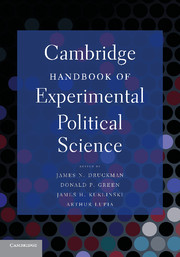Book contents
- Frontmatter
- Contents
- List of Tables
- List of Figures
- Contributors
- Acknowledgments
- INTRODUCTION
- PART I DESIGNING EXPERIMENTS
- 2 Experiments
- 3 Internal and External Validity
- 4 Students as Experimental Participants
- 5 Economics versus Psychology Experiments
- PART II THE DEVELOPMENT OF EXPERIMENTS IN POLITICAL SCIENCE
- PART III DECISION MAKING
- PART IV VOTE CHOICE, CANDIDATE EVALUATIONS, AND TURNOUT
- PART V INTERPERSONAL RELATIONS
- PART VI IDENTITY, ETHNICITY, AND POLITICS
- PART VII INSTITUTIONS AND BEHAVIOR
- PART VIII ELITE BARGAINING
- PART IX ADVANCED EXPERIMENTAL METHODS
- AFTERWORD
- Name Index
- Subject Index
- References
5 - Economics versus Psychology Experiments
Stylization, Incentives, and Deception
Published online by Cambridge University Press: 05 June 2012
- Frontmatter
- Contents
- List of Tables
- List of Figures
- Contributors
- Acknowledgments
- INTRODUCTION
- PART I DESIGNING EXPERIMENTS
- 2 Experiments
- 3 Internal and External Validity
- 4 Students as Experimental Participants
- 5 Economics versus Psychology Experiments
- PART II THE DEVELOPMENT OF EXPERIMENTS IN POLITICAL SCIENCE
- PART III DECISION MAKING
- PART IV VOTE CHOICE, CANDIDATE EVALUATIONS, AND TURNOUT
- PART V INTERPERSONAL RELATIONS
- PART VI IDENTITY, ETHNICITY, AND POLITICS
- PART VII INSTITUTIONS AND BEHAVIOR
- PART VIII ELITE BARGAINING
- PART IX ADVANCED EXPERIMENTAL METHODS
- AFTERWORD
- Name Index
- Subject Index
- References
Summary
In this chapter, I follow other authors (e.g., Kagel and Roth 1995; McDermott 2002; Camerer 2003; Morton and Williams 2010) in focusing on a few key dimensions of difference between experiments in the economic and psychological traditions.
Section 1 considers the level of stylization typical in economics and psychology experimentation. Although research in the political psychology tradition tends to place an emphasis on the descriptive realism of laboratory scenarios, work in experimental economics tends to proceed within a purposefully abstract, “context free” environment.
Section 2 considers the kinds of incentives offered to subjects by experimentalists from these two schools of thought. Experimental economists generally offer subjects monetary incentives that depend on subjects' choices in the laboratory – and, in game-theoretic experiments, the choices of other subjects as well. In contrast, psychology research tends not to offer inducements that are conditional on subjects' actions, instead giving subjects fixed cash payments or fixed amounts of course credit.
Section 3 considers the use of deception. The psychological school tends to see deception as a useful tool in experimentation, and, at times, a necessary one. In contrast, the economic school by and large considers deception to be taboo.
- Type
- Chapter
- Information
- Cambridge Handbook of Experimental Political Science , pp. 58 - 70Publisher: Cambridge University PressPrint publication year: 2011
References
- 21
- Cited by



